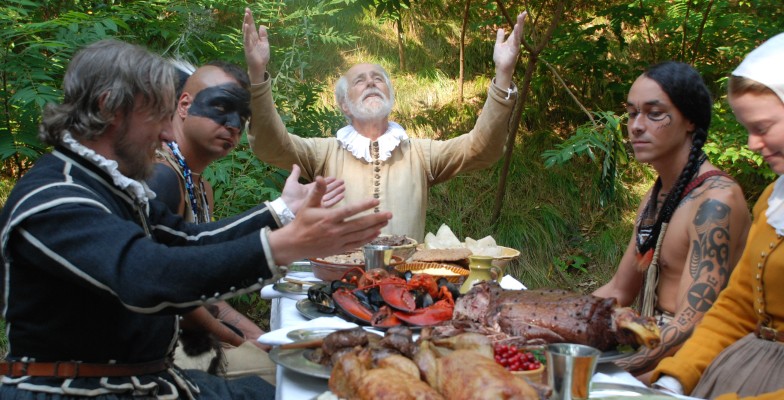In the department of strange bedfellows comes George Weigel’s praise for the Museum of the Bible:
On September 29, 1952, the publication of the complete Revised Standard Version of the Bible was celebrated at the National Guard Armory in Washington, D.C., and the principal speaker was the U.S. Secretary of State, Dean Acheson. The son of the Episcopal bishop of Connecticut, Acheson movingly described the ways in which the King James Bible, which the new RSV was to supplant, had once shaped American culture and our national life:
In the earliest days in the Northeast, the Book was All. The settlers came here to live their own reading of it. It was the spiritual guide, the moral and legal code, the political system, the sustenance of life, whether that meant endurance of hardship, the endless struggle against nature, battle with enemies, or the inevitable processes of life and death. And it meant to those who cast the mold of this country something very specific and very clear. It meant that the purpose of man’s journey through this life was to learn and identify his life and effort with the purpose and will of God.
That biblical vision helped form the bedrock convictions of the American idea: that government stood under the judgment of divine and natural law; that government was limited in its reach into human affairs, especially the realm of conscience; that national greatness was measured by fidelity to the moral truths taught by revelation and inscribed in the world by a demanding yet merciful God; that only a virtuous people could be truly free.
Of course, the U.S. is a free country and anyone can assemble the past in ways consoling.
But does anyone else feel a certain discomfort with a Roman Catholic recommending the Bible without also mentioning the objections that sometimes Bishops registered against Bible readings in public schools without comment? The United States would not have as many parochial schools as it does if not for Bishops who worried about sending children to public schools where teachers read the Protestant version of the Bible.
Not to be missed is the odd relationship between the Bible and the founding. If the settlers who came to America and launched the tradition of Thanksgiving wanted a society with a biblical vision at its bedrock, don’t you also have to mention that those same Bible-only Christians were a tad jittery about including Roman Catholics in the nation that emerged from their colonial enterprises?
This may be why some Roman Catholic political theorists are uncomfortable with Roman Catholics getting comfortable with the founding.


Darryl,
“But does anyone else feel a certain discomfort with a Roman Catholic recommending the Bible without also mentioning the objections that sometimes Bishops registered against Bible readings in public schools without comment?”
I guess when doctrine develops, discomfort is eased…
LikeLike
Robert, then comes the discomfort of eating too much on Thanksgiving.
LikeLike
Well, in the same piece he praises Acheson. I like Weigel, but sometimes he is like an grandfather wandering around JKK Airport wanting to stop and pray at the now demolished Our Lady of the Skies Chapel, or urging an Anaheim visit to what was once Disney’s House of Tomorrow. Both these attractions were very cool and rather noble; both were also in part examples of wishful thinking.
LikeLike
Well duh, RC at Plymouth Rock. When Jesus gave the keys to Peter it was akin to giving him the carving knife.
LikeLike
Has anybody been to the museum? Is it Bible verses pulled out to make the Bible sound like all law, with “grace” for those who endeavor to help themselves?
Cal Thomas quotes Bishop Fulton Sheen– “We become like that which we love. If we love what is base, we become base; but if we love what is noble, we become noble.” if Fundamentalists are going to win (or become syndicated columnists), they have to become evangelicals and join with the Roman Catholics.
https://townhall.com/columnists/calthomas/2017/11/21/the-museum-of-the-bible-is-more-than-a-museum-n2412040
John Murray– Appendix B “Leviticus 18:5” from his Romans commentary—–The problem that arises from this use of Lev. 18:5 is that the text does not appear in a context that deals with legal righteousness as opposed to that of faith. Lev. 18:5 is in a context in which the claims of God upon his redeemed and covenant people are being asserted and urged upon Israel… It refers NOT to the life accruing from doing in a legalistic framework but to the blessing attendant upon obedience in a redemptive and covenant relationship to God.”
“Those who plow iniquity and sow trouble reap the same. He who sows to his flesh will of the flesh reap corruption” (Galatians 6:7-8).
“Those who sow trouble reap it” (Job 4:8).
“He who sows righteousness will have a sure reward” (Proverbs 11:18).
LikeLike
Roman Catholics and Mormons might not be big Bible readers, but we can all agree that Jesus himself would kill anybody trying to hurt his family….religion is good (no matter what it is) just so long as faith gives us the courage and hope to do what needs to be done
Jimmy Carter—I was pleased to watch the absolutely delightful and memorable television spots that remind all of us who are members of families what our duties are, to hear the Primary Children’s Chorus singing “I Am a Child of God,” to hear the Lamanite Generation, Native Americans, singing “Go, My Son,” and then, of course, to come in and meet the Osmond family
http://www.presidency.ucsb.edu/ws/index.php?pid=30211
LikeLike